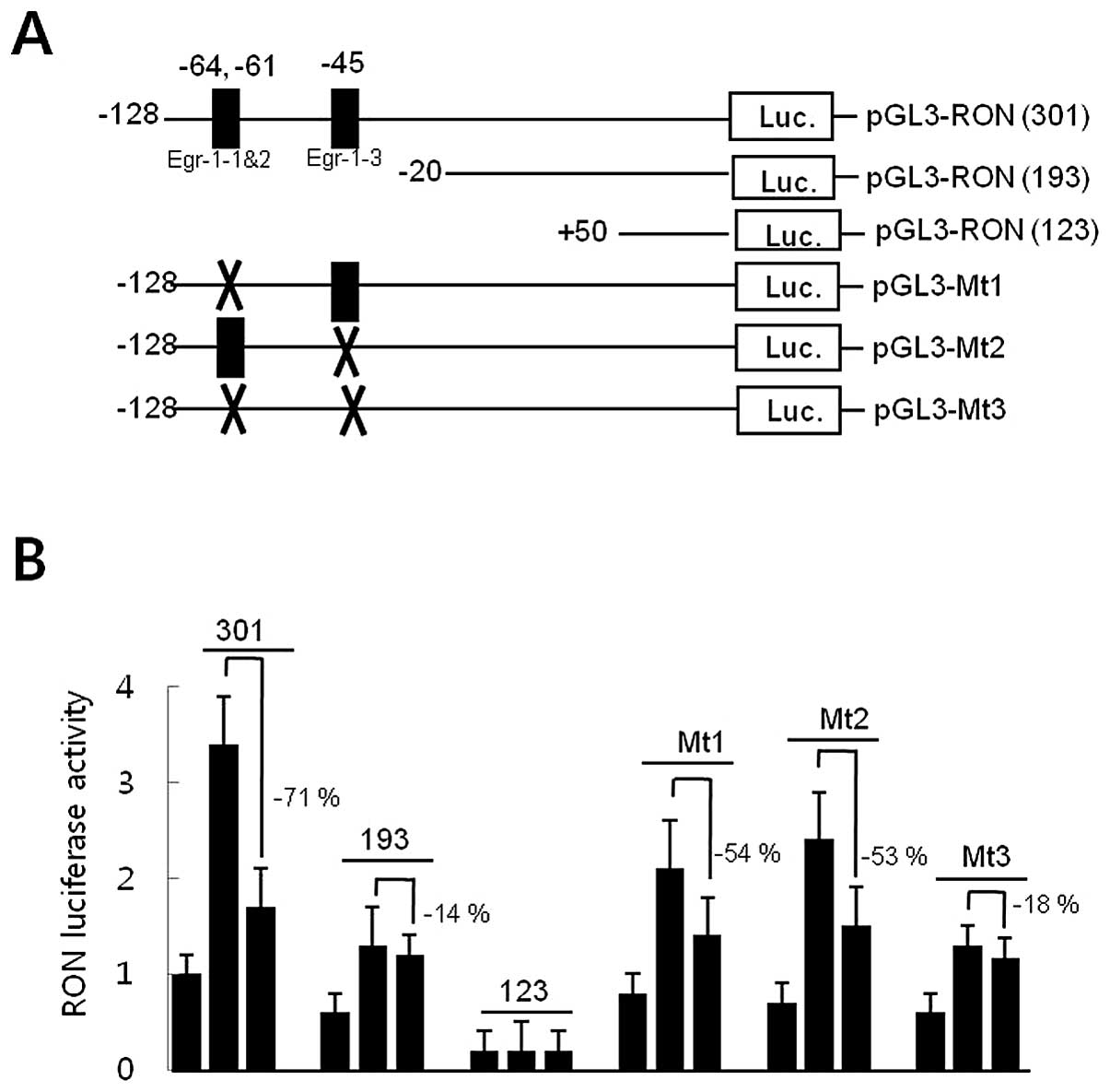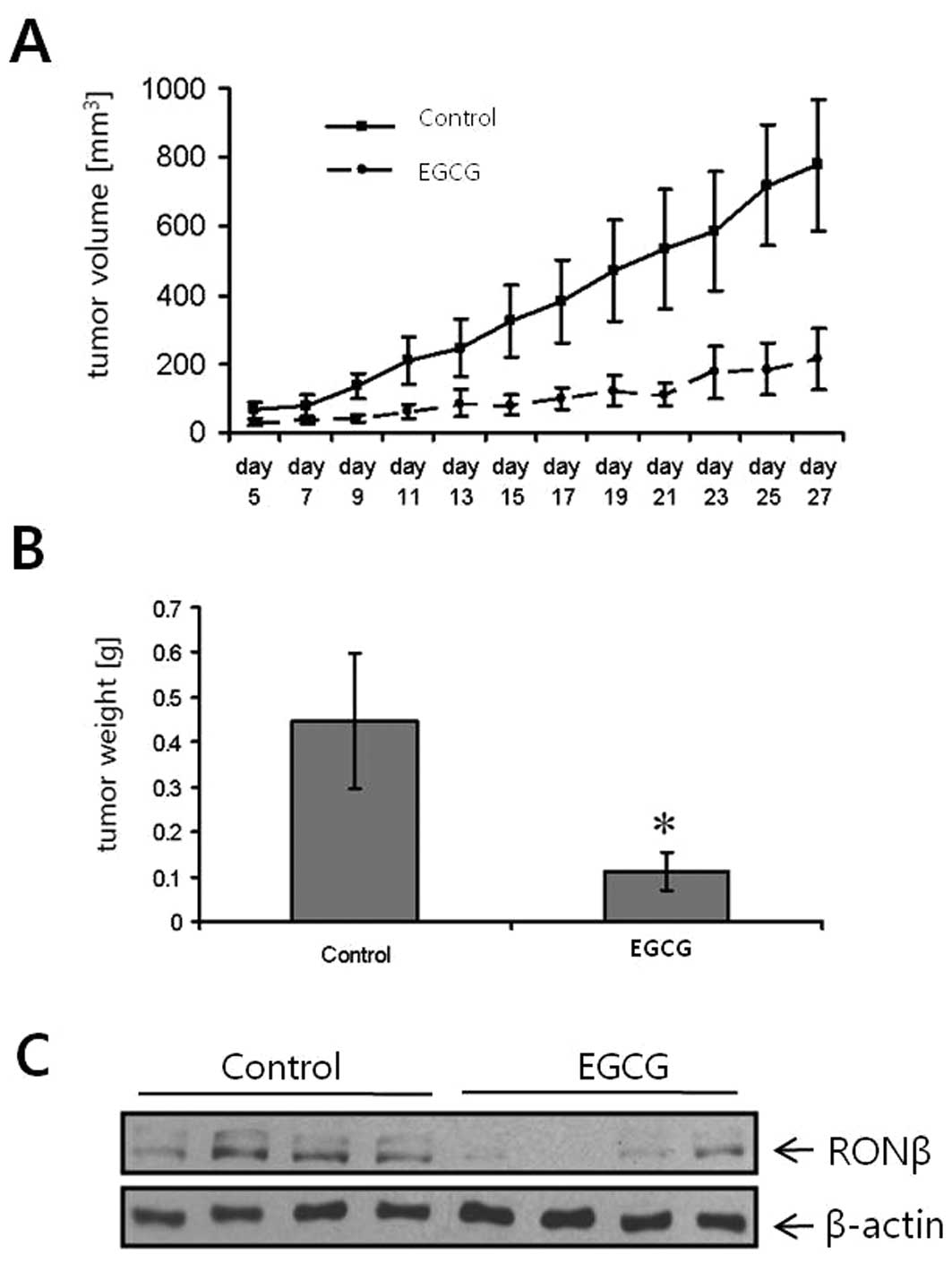|
1
|
Sasazuki S, Tamakoshi A, Matsuo K, Ito H,
Wakai K, Nagata C, Mizoue T, Tanaka K, Tsuji I, Inoue M and Tsugane
S; Research Group for the Development and Evaluation of Cancer
Prevention Strategies in Japan: Green tea consumption and gastric
cancer risk: an evaluation based on a systematic review of
epidemiologic evidence among the Japanese population. Jpn J Clin
Oncol. 42:335–346. 2012. View Article : Google Scholar : PubMed/NCBI
|
|
2
|
Yuan JM, Sun C and Butler LM: Tea and
cancer prevention: epidemiological studies. Pharmacol Res.
64:123–135. 2011. View Article : Google Scholar : PubMed/NCBI
|
|
3
|
Stoner GD and Mukhtar H: Polyphenols as
cancer chemopreventive agents. J Cell Biochem (Suppl). 22:169–180.
1995. View Article : Google Scholar : PubMed/NCBI
|
|
4
|
Yoo HG, Shin BA, Park JC, Kim HS, Kim WJ,
Chay KO, Ahn BW, Park RK, Ellis LM and Jung YD: Induction of
apoptosis by the green tea flavonol (-)-epigallocatechin-3-gallate
in human endothelial ECV 304 cells. Anticancer Res. 22:3373–3378.
2002.PubMed/NCBI
|
|
5
|
Jung YD, Kim MS, Shin BA, Chay KO, Ahn BW,
Liu W, Bucana CD, Gallick GE and Ellis LM: EGCG, a major component
of green tea, inhibits tumour growth by inhibiting VEGF induction
in human colon carcinoma cells. Br J Cancer. 84:844–850. 2001.
View Article : Google Scholar : PubMed/NCBI
|
|
6
|
Nagini S: Carcinoma of the stomach: A
review of epidemiology, pathogenesis, molecular genetics and
chemoprevention. World J Gastrointest Oncol. 4:156–169. 2012.
View Article : Google Scholar : PubMed/NCBI
|
|
7
|
Park JS, Park JH, Khoi PN, Joo YE and Jung
YD: MSP-induced RON activation upregulates uPAR expression and cell
invasiveness via MAPK, AP-1 and NF-κB signals in gastric cancer
cells. Carcinogenesis. 32:175–181. 2011.PubMed/NCBI
|
|
8
|
Feres KJ, Ischenko I and Hayman MJ: The
RON receptor tyrosine kinase promotes MSP-independent cell
spreading and survival in breast epithelial cells. Oncogene.
28:279–288. 2009. View Article : Google Scholar : PubMed/NCBI
|
|
9
|
Wang MH, Ronsin C, Gesnel MC, Coupey L,
Skeel A, Leonard EJ and Breathnach R: Identification of the ron
gene product as the receptor for the human macrophage stimulating
protein. Science. 266:117–119. 1994. View Article : Google Scholar : PubMed/NCBI
|
|
10
|
Chen YQ, Zhou YQ, Angeloni D, Kurtz AL,
Qiang XZ and Wang MH: Overexpression and activation of the RON
receptor tyrosine kinase in a panel of human colorectal carcinoma
cell lines. Exp Cell Res. 261:229–238. 2000. View Article : Google Scholar : PubMed/NCBI
|
|
11
|
Wang J, Rajput A, Kan JL, Rose R, Liu XQ,
Kuropatwinski K, Hauser J, Beko A, Dominquez I, Sharratt EA,
Brattain L, Levea C, Sun FL, Keane DM, Gibson NW and Brattain MG:
Knockdown of Ron kinase inhibits mutant phosphatidylinositol
3-kinase and reduces metastasis in human colon carcinoma. J Biol
Chem. 284:10912–10922. 2009. View Article : Google Scholar : PubMed/NCBI
|
|
12
|
Leonis MA, Thobe MN and Waltz SE:
Ron-receptor tyrosine kinase in tumorigenesis and metastasis.
Future Oncol. 3:441–448. 2007. View Article : Google Scholar : PubMed/NCBI
|
|
13
|
Thangasamy A, Rogge J and Ammanamanchi S:
Recepteur d’origine nantais tyrosine kinase is a direct target of
hypoxiainducible factor-1alpha-mediated invasion of breast
carcinoma cells. J Biol Chem. 284:14001–14010. 2009.
|
|
14
|
Lee KE, Park JS, Khoi PN, Joo YE, Lee YH
and Jung YD: Upregulation of recepteur d’origine nantais tyrosine
kinase and cell invasiveness via early growth response-1 in gastric
cancer cells. J Cell Biochem. 113:1217–1223. 2012.
|
|
15
|
Thangasamy A, Rogge J and Ammanamanchi S:
Regulation of RON tyrosine kinase-mediated invasion of breast
cancer cells. J Biol Chem. 283:5335–5343. 2008. View Article : Google Scholar : PubMed/NCBI
|
|
16
|
Zhou D, Pan G, Zheng C, Zheng J, Yian L
and Teng X: Expression of the RON receptor tyrosine kinase and its
association with gastric carcinoma versus normal gastric tissues.
BMC Cancer. 8:3532008. View Article : Google Scholar : PubMed/NCBI
|
|
17
|
Kono S, Ikeda M, Tokudome S and Kuratsune
M: A case-control study of gastric cancer and diet in northern
Kyushu, Japan. Jpn J Cancer Res. 79:1067–1074. 1988. View Article : Google Scholar : PubMed/NCBI
|
|
18
|
Rogers AE, Hafer LJ, Iskander YS and Yang
S: Black tea and mammary gland carcinogenesis by
7,12-dimethylbenz(a)anthracene in rats fed control or high fat
diets. Carcinogenesis. 19:1269–1273. 1998. View Article : Google Scholar : PubMed/NCBI
|
|
19
|
Fujiki H, Suganuma M, Okabe S, Sueoka E,
Suga K, Imai K, Nakachi K and Kimura S: Mechanistic findings of
green tea as cancer preventive for humans. Proc Soc Exp Biol Med.
220:225–228. 1999. View Article : Google Scholar : PubMed/NCBI
|
|
20
|
Liang YC, Lin-shiau SY, Chen CF and Lin
JK: Suppression of extracellular signals and cell proliferation
through EGF receptor binding by (-)-epigallocatechin gallate in
human A431 epdeidermoid carcinoma cells. J Cell Biochem. 67:55–65.
1997. View Article : Google Scholar
|
|
21
|
Kitano K, Nam KY, Kimura S, Fujiki H and
Imanishi Y: Sealing effects of (-)-epigallocatechin gallate on
protein kinase C and protein phosphatase 2A. Biophys Chem.
65:157–164. 1997. View Article : Google Scholar : PubMed/NCBI
|
|
22
|
Fu Y and Chen A: The phyto-chemical
(-)-epigallocatechin gallate suppresses gene expression of
epidermal growth factor receptor in rat hepatic stellate cells in
vitro by reducing the activity of Egr-1. Biochem Pharmacol.
72:227–238. 2006. View Article : Google Scholar
|
|
23
|
Moon Y, Lee M and Yang H: Involvement of
early growth response gene 1 in the modulation of microsomal
prostaglandin E synthase 1 by epigallocatechin gallate in A549
human pulmonary epithelial cells. Biochem Pharmacol. 73:125–135.
2007. View Article : Google Scholar : PubMed/NCBI
|
|
24
|
Thiel G and Cibelli G: Regulation of life
and death by the zinc finger transcription factor Egr-1. J Cell
Physiol. 193:287–292. 2002. View Article : Google Scholar : PubMed/NCBI
|
|
25
|
Shin SY, Kim JH, Baker A, Lim Y and Lee
YH: Transcription factor Egr-1 is essential for maximal matrix
metalloproteinase-9 transcription by tumor necrosis factor alpha.
Mol Cancer Res. 8:507–519. 2010. View Article : Google Scholar : PubMed/NCBI
|
|
26
|
Keates S, Keates AC, Nath S, Peek RM Jr
and Kelly CP: Trans-activation of the epidermal growth factor
receptor by cag+ Helicobacter pylori induces
upregulation of the early growth response gene Egr-1 in gastric
epithelial cells. Gut. 54:1363–1369. 2005.PubMed/NCBI
|
|
27
|
Ma J, Ren Z, Ma Y, Xu L, Zhao Y, Zheng C,
Fang Y, Xue T, Sun B and Xiao W: Targeted knockdown of EGR-1
inhibits IL-8 production and IL-8-mediated invasion of prostate
cancer cells through suppressing EGR-1/NF-kappaB synergy. J Biol
Chem. 284:34600–34606. 2009. View Article : Google Scholar : PubMed/NCBI
|
|
28
|
Kaufmann K and Thiel G: Epidermal growth
factor and platelet-derived growth factor induce expression of
Egr-1, a zinc finger transcription factor, in human malignant
glioma cells. J Neurol Sci. 189:83–91. 2001. View Article : Google Scholar
|
|
29
|
Cohen DM, Gullans SR and Chin WW: Urea
inducibility of egr-1 in murine inner medullary collecting duct
cells is mediated by the serum response element and adjacent Ets
motifs. J Biol Chem. 271:12903–12908. 1996. View Article : Google Scholar : PubMed/NCBI
|
|
30
|
Katiyar SK, Afaq F, Azizuddin K and
Mukhtar H: Inhibition of UVB-induced oxidative stress-mediated
phosphorylation of mitogen-activated protein kinase signaling
pathways in cultured human epidermal keratinocytes by green tea
polyphenol (-)-epigallocatechin-3-gallate. Toxicol Appl Pharmacol.
176:110–117. 2001. View Article : Google Scholar
|
|
31
|
Khan HY, Zubair H, Ullah MF, Ahmad A and
Hadi SM: Oral administration of copper to rats leads to increased
lymphocyte cellular DNA degradation by dietary polyphenols:
implications for a cancer preventive mechanism. Biometals.
24:1169–1178. 2011. View Article : Google Scholar
|
|
32
|
Lin JK: Cancer chemoprevention by tea
polyphenols through modulating signal transduction pathways. Arch
Pharm Res. 25:561–571. 2002. View Article : Google Scholar : PubMed/NCBI
|
|
33
|
O’Toole JM, Rabenau KE, Burns K, Lu D,
Mangalampalli V, Balderes P, Covino N, Bassi R, Prewett M,
Gottfredsen KJ, Thobe MN, Cheng Y, Li Y, Hicklin DJ, Zhu Z, Waltz
SE, Hayman MJ, Ludwig DL and Pereira DS: Therapeutic implications
of a human neutralizing antibody to the macrophage-stimulating
protein receptor tyrosine kinase (RON), a c-MET family member.
Cancer Res. 66:9162–9170. 2006.
|
|
34
|
Logan-Collins J, Thomas RM, Yu P, Jaquish
D, Mose E, French R, Stuart W, McClaine R, Aronow B, Hoffman RM,
Waltz SE and Lowy AM: Silencing of RON receptor signaling promotes
apoptosis and gemcitabine sensitivity in pancreatic cancers. Cancer
Res. 70:1130–1140. 2010. View Article : Google Scholar : PubMed/NCBI
|



















